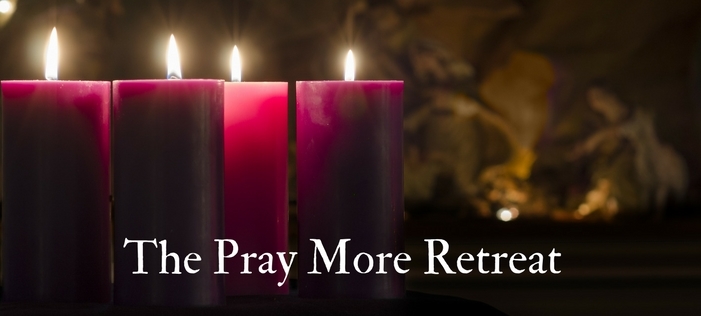Summary
Katie Sciba talks about the true meaning of God’s mercy and how we can see it in our everyday lives.
Thank you for watching and participating in this retreat!
Not Registered, yet? Don’t miss the rest of the talks! Register for the Pray More Retreat!
Downloads
Audio MP3
Click here to download the audio file.
Printable Study Guide PDF
Click here to download the printable study guide.
Printable Transcript PDF
Click here to download the transcript of the video presentation.
Reflective Study Guide Questions
“I muse on what your hand has wrought.”
Psalm 134:5
- In this talk, Katie shares examples of what mercy looks like on a daily basis. The little ways we help others who are incapable. How have you been shown mercy recently?
- Mercy is showing compassion for other’s difficulty. Who in your life is having difficulty? How can you show mercy to them?
- When Jesus appeared to St. Faustina in Poland he said, “I am love and mercy itself. There is no misery that could be a match for my mercy. The soul that trusts in my mercy is most fortunate because I myself take care of it.” How have you seen or experienced Jesus’ mercy? Say a quick prayer about trusting in the mercy of Jesus.
- Psalm 134:5 that Katie quoted in her talk said, “I muse on what your hand has wrought”. Take a moment to ponder the past and how the Lord has upheld you in both your blessings and your trials.
Text: Jesus: Love and Mercy Itself
Hi, I’m Katie Sciba, and welcome to our first session in The Pray More Advent Retreat. Let’s pray.
Opening Prayer
In the name of the Father, and of the Son, and of the Holy Spirit, Amen. Jesus, you are love and mercy itself. Give us the graces necessary to hear you speaking in our lives. Soften our hearts to receive your mercy so we can experience the joy and freedom you desire for us. We ask this through your holy name, Amen.
What is Mercy?
So, it’s Advent. We are going to talk about the mercy of God. What real mercy is and the fact that the Lord has offered us compassion in mercy throughout all time. And we’ll also cover how we can receive it because it’s readily available to us. So, we’ll talk about how we can get our hands on mercy, how we can receive it from the Lord.
We hear the word over and over again so much that we don’t catch the full force of what it is. So colloquially speaking, when I think of mercy, I think of someone super guilty not getting some kind of punishment they deserve. I think of someone begging, like, “Have mercy!” And while that’s a small aspect of what mercy is, in short, it is when I make your problem my problem, but in a healthy way. There’s an incredible variation on what mercy looks like, but at its center, mercy is showing compassion for another’s difficulty.
Examples of Mercy
So, let’s talk about this. About a year ago, I was at my son’s third grade basketball game. I don’t know if you’ve ever been to a basketball game played by a bunch of eight-year-olds, but it is chaos. So it’s a group of little boys running across the court. One has the ball, maybe nobody knows who has the ball, there is no strategy, and it is cutthroat, and it is adorable.
So, in the middle of the game at one point, everything stopped. This total mayhem just came to an abrupt halt. There was no whistle, but everything ceased. And all the parents were looking over, “What happened? What happened?” And there’s a little boy who came up to a ref and stuck his foot out in front of the ref and just looked at him, and his shoe was untied. And so, this ref, he was an old timer, he had been in the game a long time. He just kind of shook his head and chuckled, took a knee, and tied the kid’s shoe. He did for that child what the little boy couldn’t do for himself. So that’s one example.
Here’s another example. I am about 5’4, 5’5, and my husband is a full foot taller than I am. And in our kitchen, we have this massive griddle that I use to make pancakes. This thing is behemoth, and it has no place in our tiny kitchen except for the highest possible cabinet that we have. And oftentimes, if I’m going to get it by myself, I need a stool, I need to get both my knees up on the counter, and I have to balance while I’m opening the cabinet, get it out, and then maneuver down my makeshift ladder. But, if my husband is home, I can say, “Hey babe, could you grab that?” And it’s no problem for him. He goes right over and in one second the cabinet’s open, the griddle’s down, and I’m on my way.
A Message from God to St. Faustina
All right, so two super simple, very basic examples that honestly you might not even give much thought to but entail someone capable acting for someone who is incapable. When you’re doing that with love, you’re acting in mercy.
In the 1930s, Jesus began appearing to St. Faustina in Poland with a message that He said was not only for her but for all humanity. He said, “I am love and mercy itself. There is no misery that could be a match for my mercy. The soul that trusts in my mercy is most fortunate because I myself take care of it.” “I myself take care of it.” The Lord is all powerful, all capable, all loving, and He is ready to uphold us in every single one of our shortcomings and in our limitations. And most importantly, in repenting of our sins.
One of my favorite verses in all of Scripture is Psalm 143:5. “I’m used on what your hand has wrought.” And that means that we look back. We take a good look, and we ponder, we consider the past and we realize how God has upheld us in our blessings and in our trials. And so, we can see the mercy of God so clearly throughout the Old Testament, and especially in the very beginning.
Genesis Chapter Three
So, in Genesis chapter three, everything was good at that point. Adam and Eve, they were made. Everything was very good. They had what was called original harmony. So, they were happy, garden’s happy, they have wonderful relationship with God, their creator, and then here comes the serpent, who honestly sells Eve something she already has. He says to her, “If you eat from that tree, you will be like God.” How, but she was made in the image and likeness of God? And so, she already had that. Still, Eve sinned, Adam sinned, and they broke not only their relationship with God, but humanity’s relationship with God.
But almost immediately after, the Lord comes into the garden seeking Adam and Eve. And after receiving from them their account of what happened He addresses each one and then sang to the serpent, “I will put enmity between you and the woman, between your seed and her seed. He shall crush your head and you shall bruise his heel.” This verse is Genesis 3:15, and it’s called the protoevangelium, which means it is the first occasion of the good news. It is here in Genesis that we learn the relationship between humanity and God is broken and God is going to restore it. And not only will He restore it, but He’s going to restore it by sending His son who will defeat death and defeat sin. Jesus was coming, which is now the very event we’re anticipating.
God’s Mercy to the Hebrews
So, hundreds of years later, we have the Hebrews trapped in slavery in Egypt and theirs was a hopeless situation. They could not get out of slavery on their own. And the Lord appeared to Moses in the form of a burning bush and said, “I have witnessed the affliction of my people. I have heard their cry and I know well what they are suffering. Therefore, I have come down to rescue them from the hands of the Egyptians and lead them out of that land into a good and spacious land. A land flowing with milk and honey.”
The Hebrews were incapable to free themselves, so in His mercy, out of love for His people God sent Moses to lead them from Egypt. And not only were they free from slavery, but they also experienced abundance in the Promised Land, and that is a tremendous act of mercy.
Closing Prayer
Let’s pray. Father in heaven, your hands have wrought salvation for our souls. Help us to entrust ourselves to your unfathomable mercy and to draw hope from your love in the Old Testament. We ask this in the name of Jesus, Amen. In the name of the Father, and of the Son, and of the Holy Spirit, Amen.
About Katie Sciba:

Katie Sciba is a national speaker, retreat writer, and eight-time Catholic Press Award-winning columnist. She has a degree in theology from Benedictine College, and her work on Catholic minimalism, spiritual intimacy with Jesus, as well as marriage and family has impacted audiences nationwide. Katie writes for The Catholic Telegraph in Cincinnati and has been featured on several podcasts and radio shows. Her humor and honesty enable her to connect well with a crowd. Katie and her family live happily in the suburbs of Omaha, Nebraska.
